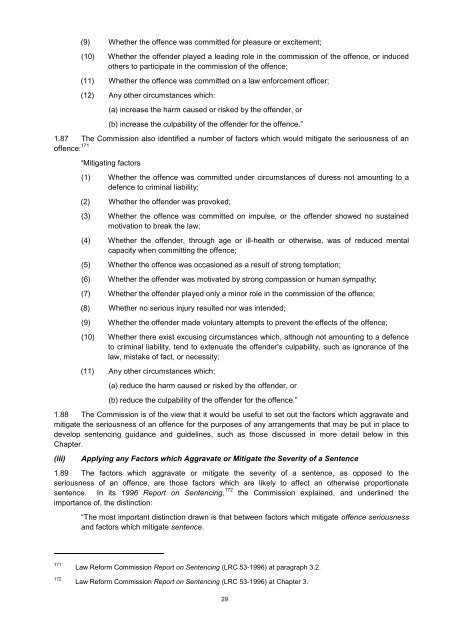Report on Mandatory Sentences - Law Reform Commission
Report on Mandatory Sentences - Law Reform Commission
Report on Mandatory Sentences - Law Reform Commission
Create successful ePaper yourself
Turn your PDF publications into a flip-book with our unique Google optimized e-Paper software.
(9) Whether the offence was committed for pleasure or excitement;<br />
(10) Whether the offender played a leading role in the commissi<strong>on</strong> of the offence, or induced<br />
others to participate in the commissi<strong>on</strong> of the offence;<br />
(11) Whether the offence was committed <strong>on</strong> a law enforcement officer;<br />
(12) Any other circumstances which:<br />
(a) increase the harm caused or risked by the offender, or<br />
(b) increase the culpability of the offender for the offence.”<br />
1.87 The Commissi<strong>on</strong> also identified a number of factors which would mitigate the seriousness of an<br />
offence: 171<br />
“Mitigating factors<br />
(1) Whether the offence was committed under circumstances of duress not amounting to a<br />
defence to criminal liability;<br />
(2) Whether the offender was provoked;<br />
(3) Whether the offence was committed <strong>on</strong> impulse, or the offender showed no sustained<br />
motivati<strong>on</strong> to break the law;<br />
(4) Whether the offender, through age or ill-health or otherwise, was of reduced mental<br />
capacity when committing the offence;<br />
(5) Whether the offence was occasi<strong>on</strong>ed as a result of str<strong>on</strong>g temptati<strong>on</strong>;<br />
(6) Whether the offender was motivated by str<strong>on</strong>g compassi<strong>on</strong> or human sympathy;<br />
(7) Whether the offender played <strong>on</strong>ly a minor role in the commissi<strong>on</strong> of the offence;<br />
(8) Whether no serious injury resulted nor was intended;<br />
(9) Whether the offender made voluntary attempts to prevent the effects of the offence;<br />
(10) Whether there exist excusing circumstances which, although not amounting to a defence<br />
to criminal liability, tend to extenuate the offender's culpability, such as ignorance of the<br />
law, mistake of fact, or necessity;<br />
(11) Any other circumstances which:<br />
(a) reduce the harm caused or risked by the offender, or<br />
(b) reduce the culpability of the offender for the offence.”<br />
1.88 The Commissi<strong>on</strong> is of the view that it would be useful to set out the factors which aggravate and<br />
mitigate the seriousness of an offence for the purposes of any arrangements that may be put in place to<br />
develop sentencing guidance and guidelines, such as those discussed in more detail below in this<br />
Chapter.<br />
(iii)<br />
Applying any Factors which Aggravate or Mitigate the Severity of a Sentence<br />
1.89 The factors which aggravate or mitigate the severity of a sentence, as opposed to the<br />
seriousness of an offence, are those factors which are likely to affect an otherwise proporti<strong>on</strong>ate<br />
sentence. In its 1996 <str<strong>on</strong>g>Report</str<strong>on</strong>g> <strong>on</strong> Sentencing, 172 the Commissi<strong>on</strong> explained, and underlined the<br />
importance of, the distincti<strong>on</strong>:<br />
“The most important distincti<strong>on</strong> drawn is that between factors which mitigate offence seriousness<br />
and factors which mitigate sentence.<br />
171<br />
172<br />
<strong>Law</strong> <strong>Reform</strong> Commissi<strong>on</strong> <str<strong>on</strong>g>Report</str<strong>on</strong>g> <strong>on</strong> Sentencing (LRC 53-1996) at paragraph 3.2.<br />
<strong>Law</strong> <strong>Reform</strong> Commissi<strong>on</strong> <str<strong>on</strong>g>Report</str<strong>on</strong>g> <strong>on</strong> Sentencing (LRC 53-1996) at Chapter 3.<br />
29
















